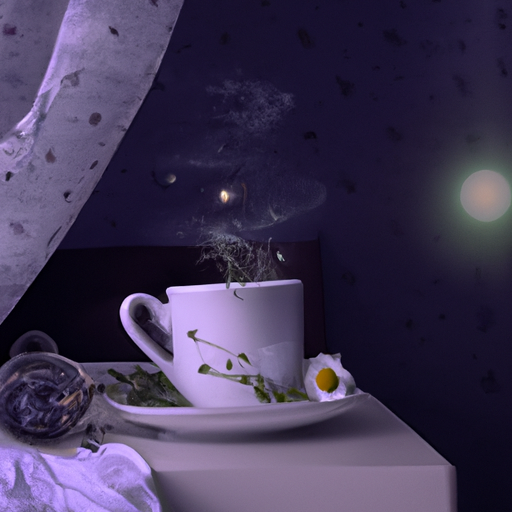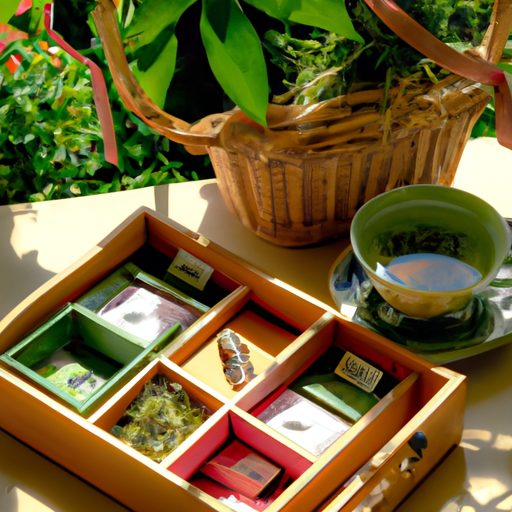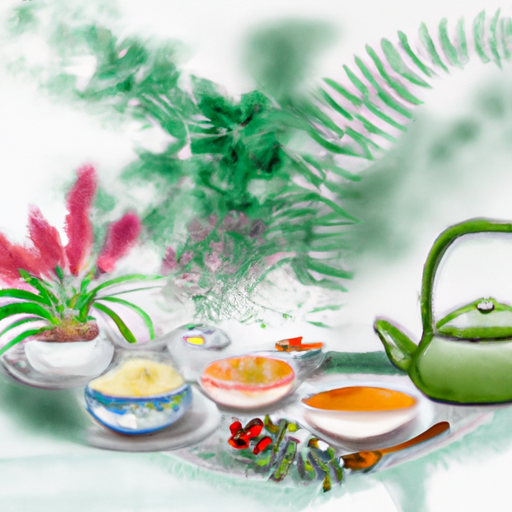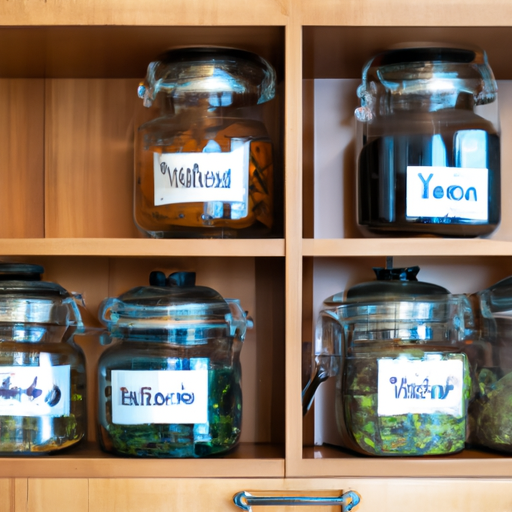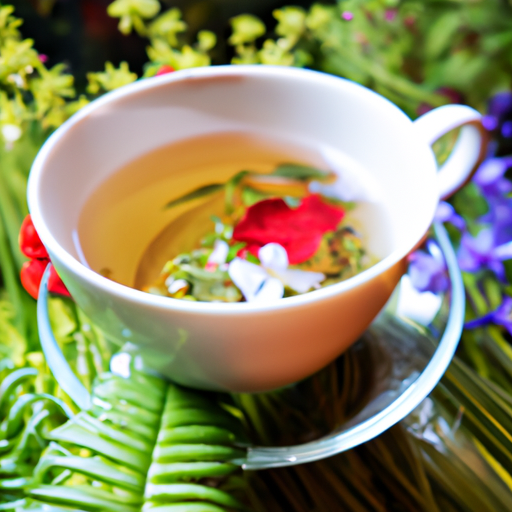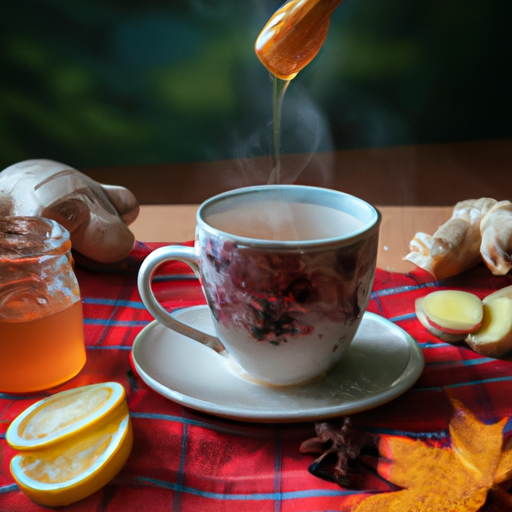When it comes to getting a good night’s sleep, there are few things more frustrating than being unable to find that elusive state of relaxation and tossing and turning.
Thankfully, nature has provided us with a calming solution: herbal tea. By harnessing the power of plants, we can find the tranquility we seek and drift off into a peaceful slumber.
In this article, I will explore the world of herbal teas and their potential to promote better sleep. From the soothing chamomile to the fragrant lavender, we will delve into the various options available and discover which ones are best suited for our individual needs.
Imagine sipping a warm cup of chamomile tea, feeling the stress of the day melt away as its gentle aroma fills the air.
Or perhaps you prefer the delicate flavor of lavender tea, with its calming properties that can lull you into a deep and restful sleep.
Join me on this journey as we explore the natural remedies that can help us achieve the rejuvenating sleep we deserve. Let’s unlock the secrets of herbal tea and embrace a more peaceful night’s rest.
Key Takeaways
- Chamomile tea promotes relaxation and sleep with its calming properties and sedative compounds.
- Lavender tea enhances relaxation and improves sleep quality with its calming effects on the body and mind.
- Valerian root tea promotes relaxation, improves sleep quality, and reduces time to fall asleep by interacting with neurotransmitters to regulate anxiety.
- Passionflower tea reduces anxiety levels, promotes relaxation, and enhances sleep quality by reducing anxiety.
Chamomile Tea
If you’re struggling to fall asleep, chamomile tea is the soothing remedy you need to unwind and drift off into a peaceful slumber. Chamomile tea has been used for centuries for its calming properties and is known to promote relaxation and sleep. It’s derived from the chamomile flower and is rich in antioxidants and compounds that have a sedative effect on the body.
One of the main benefits of chamomile tea is its ability to reduce anxiety and stress, which are common factors that can interfere with sleep. The tea contains an antioxidant called apigenin, which binds to specific receptors in the brain that promote sleepiness and reduce insomnia. Drinking chamomile tea before bed can help calm the mind and prepare the body for a restful night’s sleep.
To make chamomile tea, simply steep a chamomile tea bag or dried chamomile flowers in hot water for about 5 minutes. You can also add a touch of honey or lemon for flavor. Sip on this warm and fragrant tea about 30 minutes before bed to reap its sleep-inducing benefits.
Now, let’s transition to the subsequent section about lavender tea, another herbal tea that can help with sleep.
Lavender Tea
Imagine sipping on a warm cup of lavender tea, allowing its soothing aroma to envelop you and gently guide you into a peaceful night’s rest.
Lavender tea, derived from the aromatic lavender plant, has been used for centuries to promote relaxation and improve sleep quality. Here are some benefits of lavender tea and how to make it:
-
Calming effects: Lavender tea contains compounds that’ve been found to have calming effects on the body and mind. It can help reduce anxiety and stress, allowing you to unwind and prepare for a restful sleep.
-
Improved sleep quality: Drinking lavender tea before bedtime has been shown to improve sleep quality, helping you fall asleep faster and stay asleep longer.
-
Enhanced relaxation: The soothing aroma of lavender tea can create a serene environment, promoting a sense of relaxation and tranquility.
-
Antioxidant properties: Lavender tea is rich in antioxidants, which help protect the body against oxidative stress and promote overall well-being.
To make lavender tea, simply steep dried lavender flowers in hot water for about 5-10 minutes. You can add honey or lemon for a touch of sweetness.
As you transition to the subsequent section about valerian root tea, you’ll discover another herbal tea that can further enhance your sleep experience.
Valerian Root Tea
Valerian root tea, derived from the valerian plant, is known for its calming effects and has been used for centuries to promote relaxation and improve sleep quality. Numerous studies have shown that valerian root tea can reduce the time it takes to fall asleep by 15-20 minutes, making it an effective natural remedy for those struggling with insomnia or sleep disturbances.
One of the main benefits of valerian root tea is its ability to enhance sleep quality. The tea contains compounds that interact with certain neurotransmitters in the brain, such as gamma-aminobutyric acid (GABA), which helps regulate anxiety and promote relaxation. This can lead to a more restful and rejuvenating sleep experience.
To make valerian root tea, start by steeping one teaspoon of dried valerian root in a cup of hot water for about 10-15 minutes. Strain the tea and enjoy it before bedtime. It’s important to note that valerian root tea has a strong and distinct aroma, so some people prefer to add a natural sweetener or mix it with other herbal teas to improve its taste.
Moving on to the next herbal tea, peppermint tea, it also offers numerous benefits for sleep and relaxation.
Peppermint Tea
Peppermint tea is a wonderful herbal remedy that I’ve found to be incredibly soothing for digestive discomfort. The natural properties of peppermint help to calm the stomach and alleviate bloating, making it a great choice after a heavy meal.
Additionally, I’ve noticed that drinking peppermint tea before bed promotes better sleep by relaxing the body and easing tension.
Lastly, the refreshing aroma and cooling sensation of peppermint tea helps to relieve muscle tension and promote overall relaxation, making it a perfect choice for unwinding after a long day.
Soothes Digestive Discomfort, Promoting Better Sleep
Sipping on a cup of chamomile tea can help ease digestive discomfort, allowing for a more restful night of sleep. Chamomile has soothing effects on the nervous system, aiding in better sleep quality and duration. It reduces stress and anxiety, leading to a more restful sleep. The gentle aroma of chamomile tea has a calming effect, helping to relax both the mind and body.
The tea contains compounds like apigenin, which binds to certain receptors in the brain that promote sleepiness and reduce insomnia. Additionally, chamomile tea can relax the muscles in the digestive tract, easing any discomfort and promoting better digestion. With a relaxed mind and a soothed digestive system, falling asleep becomes easier and more natural. This natural remedy is a holistic and evidence-based approach to achieving a peaceful night’s sleep.
Moving on to the next section, chamomile tea also relieves muscle tension and promotes relaxation.
Relieves Muscle Tension and Promotes Relaxation
Indulging in a warm cup of chamomile tea is like having a gentle masseuse soothing your muscles and lulling you into a state of blissful relaxation. Chamomile tea has long been known for its ability to relieve muscle tension and promote relaxation, making it an ideal herbal remedy for those seeking a peaceful night’s sleep.
The natural compounds found in chamomile help to relax the muscles, allowing for a deep sense of calm to wash over the body. Studies have shown that chamomile tea can even help reduce symptoms of anxiety and promote a restful sleep. So, if you’re looking for a natural way to unwind and prepare for a good night’s rest, chamomile tea is the perfect choice.
Now, let’s move on to the benefits of lemon balm tea.
Lemon Balm Tea
For a calming and peaceful night’s rest, try steeping some Lemon Balm Tea, it’s the perfect herbal remedy to help you unwind before bed. Lemon balm, also known as Melissa officinalis, has been used for centuries to promote relaxation and alleviate anxiety. Its calming effects on anxiety and stress make it an excellent choice for those looking to soothe their minds and bodies before bedtime.
Studies have shown that lemon balm may also have potential benefits for cognitive function and memory. The natural compounds found in lemon balm have been found to support brain health and improve cognitive performance. So, not only will you be able to relax and sleep better, but you may also experience improved mental clarity and focus.
To truly capture the essence of Lemon Balm Tea, imagine yourself in a serene garden, surrounded by beautiful lemon-scented flowers. Close your eyes and take a deep breath, allowing the soothing aroma to wash over you. As you sip the warm tea, feel the tension melt away from your muscles, leaving you in a state of complete relaxation.
Now, let’s explore another herbal tea that can further enhance your sleep experience: passionflower tea.
Passionflower Tea
Passionflower tea, known for its calming properties, has been shown to reduce anxiety levels by 36% in a clinical study. This delightful herbal tea offers a range of health benefits for anxiety relief. Let me share with you some fascinating facts about passionflower tea:
-
Passionflower tea promotes relaxation: The natural compounds found in passionflower have been found to have a sedative effect on the central nervous system, helping to calm the mind and ease anxiety.
-
Enhances sleep quality: By reducing anxiety, passionflower tea can help improve sleep quality. It aids in falling asleep faster, staying asleep longer, and waking up feeling refreshed.
-
Natural remedy for insomnia: Passionflower tea can be a gentle and effective remedy for those struggling with insomnia. Its soothing properties help relax the body and mind, allowing for a peaceful night’s sleep.
Now that you’re intrigued by the health benefits of passionflower tea for anxiety relief, let me guide you on how to brew the perfect cup for better sleep:
-
Start by boiling water and adding two teaspoons of dried passionflower leaves to a cup.
-
Pour the hot water over the leaves and let it steep for about 10 minutes.
-
Strain the tea and enjoy it warm, preferably 30 minutes before bedtime.
With a cup of passionflower tea in hand, you can drift into a restful slumber. Speaking of natural sleep aids, let’s now explore the wonders of magnolia bark tea.
Magnolia Bark Tea
Now, let me introduce you to the invigorating benefits of sipping on a warm cup of magnolia bark tea, which’ll leave you feeling refreshed and rejuvenated.
Magnolia bark has been used for centuries in traditional medicine for its numerous health benefits. This herbal tea is known for its calming properties, making it an excellent choice for those struggling with sleep issues.
Magnolia bark tea is a natural remedy that can help promote relaxation and improve sleep quality. It contains compounds that act as sedatives, helping to calm the mind and promote a sense of tranquility. This tea can be particularly beneficial for individuals dealing with anxiety or stress-related sleep disturbances.
To make magnolia bark tea, start by boiling water and adding a tablespoon of dried magnolia bark to a teapot or infuser. Let the tea steep for about 10 minutes to allow the beneficial compounds to infuse into the water. You can also add other herbs like chamomile or lavender to enhance the tea’s calming effects.
Sipping on a cup of magnolia bark tea before bedtime can help you unwind and prepare for a restful night’s sleep. Its natural properties make it a gentle and effective option for those seeking a holistic approach to sleep support. So why not give magnolia bark tea a try and experience its rejuvenating benefits for yourself?
Frequently Asked Questions
How long does it take for herbal tea to have an effect on sleep?
Herbal tea can take around 30 minutes to an hour to have an effect on sleep. Different types vary in effectiveness, so it’s important to find the right one for you. I recommend a dosage of 1-2 cups before bed for improved sleep quality.
Are there any side effects associated with drinking herbal tea for sleep?
When considering herbal tea for sleep, it’s important to be aware of potential risks and interactions with other medications. It’s always best to consult with a healthcare professional for personalized advice.
Can herbal tea be combined with other sleep aids or medications?
Combining herbal tea with other sleep aids or medications has both pros and cons. While it can enhance the effects of sleep aids, caution must be taken to avoid potential interactions. Consulting a healthcare professional is recommended.
How often should I drink herbal tea to see noticeable improvements in my sleep?
To see noticeable improvements in sleep, I recommend drinking herbal tea regularly. Experiment with different blends to find what works best for you. Also, try brewing techniques like steeping for longer periods or using hotter water for maximum sleep benefits.
Is it safe for pregnant or breastfeeding women to consume herbal tea for sleep?
As a holistic and natural approach, it’s important to consider safety concerns for pregnant or breastfeeding women when consuming herbal tea for sleep. Choosing the right herbal tea can enhance sleep quality.
Conclusion
After exploring several herbal teas that aid in sleep, it’s clear that nature provides us with soothing remedies.
Chamomile tea, with its gentle embrace, lulls us into a peaceful slumber.
Lavender tea, like a fragrant lullaby, calms our minds and relaxes our bodies.
Valerian root tea, a tranquil elixir, helps us drift into a restful state.
Peppermint tea, like a refreshing breeze, soothes our senses.
Lemon balm tea, a gentle whisper, eases our worries.
Passionflower tea, a serene melody, encourages deep sleep.
And finally, magnolia bark tea, a botanical lullaby, gently guides us into dreamland.
With these natural remedies, sleep becomes a harmonious symphony.

